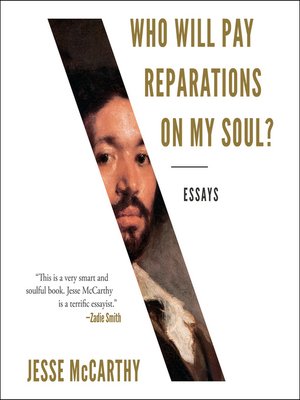
Sign up to save your library
With an OverDrive account, you can save your favorite libraries for at-a-glance information about availability. Find out more about OverDrive accounts.
Find this title in Libby, the library reading app by OverDrive.



Search for a digital library with this title
Title found at these libraries:
| Loading... |
Even as our world has suffered through successive upheavals, Jesse McCarthy contends, "something was happening in the world of culture: a surging and unprecedented visibility at every level of black art making." Who Will Pay Reparations on My Soul? reckons with this resurgence, arguing for the central role of art and intellectual culture in an age of widening inequality and moral crisis. McCarthy reinvigorates the essay form as a space not only for argument but for experimental writing that mixes and chops the old ways into new ones. In "Notes on Trap," he borrows a conceit from Susan Sontag to reveal the social and political significance of trap music. In "Back in the Day," McCarthy evokes his childhood in Paris through an elegiac account of French rap in the 1990s. In "The Master's Tools," the relationship between Spanish painter Diego Velázquez and his acolyte-slave, Juan de Pareja, becomes the lens through which Kehinde Wiley's paintings are viewed, while "To Make a Poet Black" explores the hidden blackness of Sappho and the erotic power of Phillis Wheatley. Essays on John Edgar Wideman, Claudia Rankine, and Colson Whitehead survey the state of black letters, and, in his title essay, McCarthy takes on the question of reparations, arguing that true progress will not come until Americans remake their institutions in the service of true equality.






